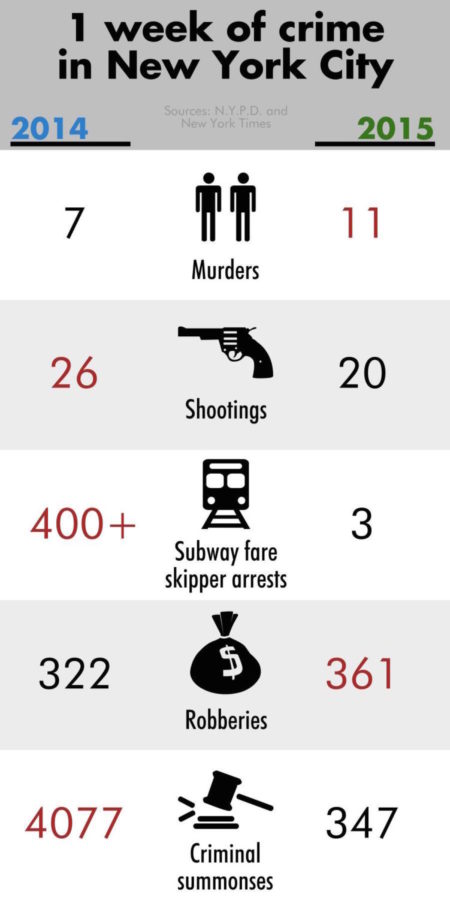Snyder: Police slowdown will not work
Infographic: Richard Martinez/Iowa State Daily
The New York Police Department breaks down the average crime rates of various offenses in one week compared to last year’s numbers.
January 12, 2015
Following the murder of two New York City Police Officers, Rafael Ramos and Wenjian Liu, and the subsequent and ongoing argument between their fellow officers and New York City Mayor Bill de Blasio, the N.Y.P.D. seems to be employing a new tactic for expressing their frustrations.
Rather than the officers simply turning their backs on de Blasio as he speaks at funerals — something that I hope he won’t have to do again in the coming months — they have unofficially initiated a work slowdown. The police officers are still responding regularly to serious crime, but in what is deemed “broken window” offenses, which means that small time offenses are being overlooked.
Examples of the slowdown can be seen in the total lack of parking tickets issued and a decrease in citations for subway turnstile jumpers. As reported by the Washington Post, there were zero parking tickets issued in the Coney Island precinct and only three arrests for subway fare skippers. Last year, during this particular week, there were 400 such arrests.
The city is losing a fairly sizable sum of money in parking tickets alone, but the feeling of the New York Daily News is that officers may not be sweating those losses, due to an ongoing contract dispute with the city, the contract they are currently working under expired in 2010.
So this could mean that if you’re, oh, I don’t know, selling loose cigarettes on Staten Island, you probably won’t be arrested, much less illegally held in a chokehold and killed as a result.
So who exactly is suffering as a result of this police slowdown? Certainly not the petty criminals and traffic violators of New York, nor the publicly intoxicated or publicly urinating, they’re getting off free and easy.
Maybe instead, it’s the families of the 11 people who were murdered last week. Maybe it’s the 361 victims of reported robberies. Both of those numbers are up from this particular week last year, according to the New York Times. One week hardly represents a trend, but the possibilities are more than disturbing.
The decreased police presence — or at least the decreased enforcement — must be noticeable to all citizens by now. For some citizens, this will bring a sense of relief, while for others, it will bring a feeling of fear. Most regrettably, — as the rise in robberies and murders has already shown — it will instill some a sense of opportunity.
As noted by Emily Badger of the Washington Post, the N.Y.P.D. might have entrapped themselves in a losing situation.
“If serious crime does not rise while police allow minor crimes to slide by, that would offer more evidence that such aggressive policing isn’t essential to maintain public order … Now, what if crime rises? That alternative scenario would look arguably even worse for the police, as it would illustrate that their union is willing to sacrifice public safety in a standoff with the mayor,” says Badger.
I do not claim to know how officers Ramos or Liu lived their lives and I do not know how they would view the current actions of their fellow officers, who all vowed to protect and serve, but I do like to imagine that I have some idea of how they viewed their work while they still served the people of New York City.
I choose to believe that they did their jobs out of a sense of right. I chose to believe that they loved their city and its people. I chose to believe that they would be against this slowdown, especially if it is tied to their names.
Every police officer knows that they have a difficult, if not the most difficult job in this nation. It is often thankless and too often results in tragedy. However, each one of them must have understood the risks in front of them even as they were initially pursuing their careers. To exhibit caution in policing a populous that you feel has shown you extreme disdain is one thing, but to engage in what amounts to a refusal to perform your vital and highly important duty in the face of scrutiny, is an outright failure.

















